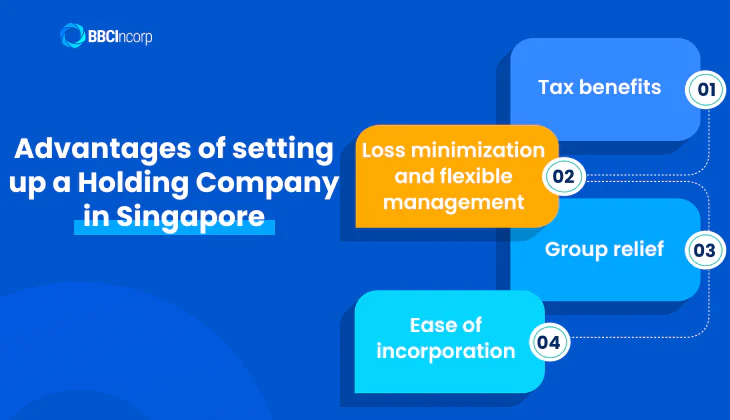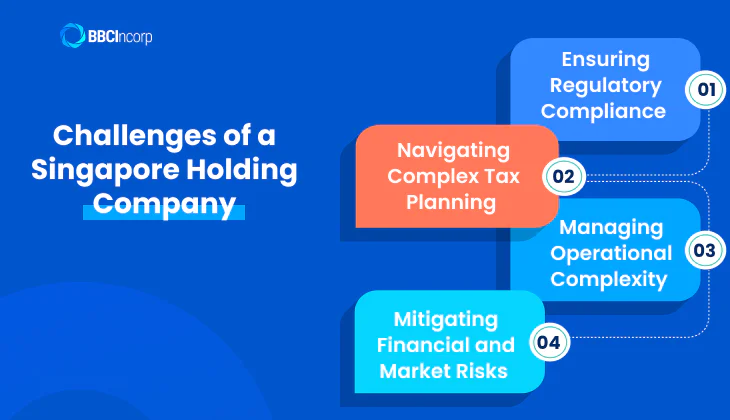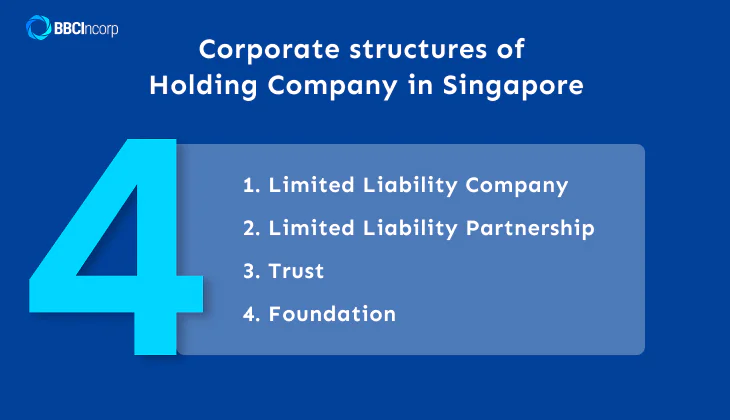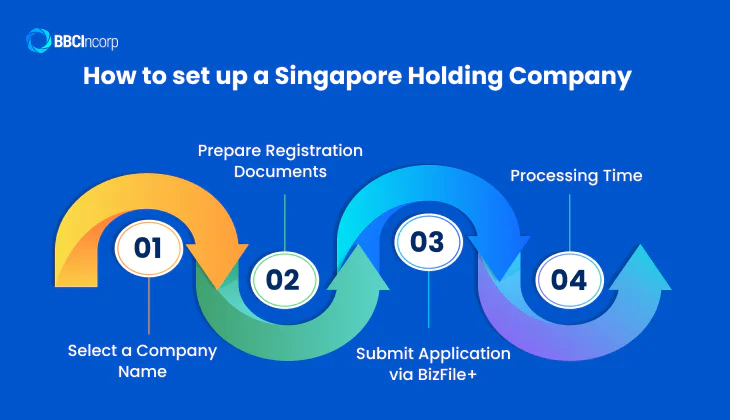
- What is Holding Company in Singapore
- Advantages of setting up a Holding Company in Singapore
- Challenges of a Singapore Holding Company
- Corporate structures of Holding Company in Singapore
- How to set up a Singapore Holding Company
- What are the compliance requirements after setting up a Holding Company in Singapore?
- Bank account application for Singapore Holding Company
- How can BBCincorp help your company comply with regulations?
- Conclusion
A Holding Company in Singapore is one of the most preferred corporate structures for both local and international investors who aim to consolidate ownership, streamline management, and benefit from Singapore’s globally competitive tax regime.
As of 2024, Singapore hosts more than 37,000 international companies, many of which adopt the Holding Company model to take advantage of the country’s 17% corporate tax rate, extensive network of over 100 Double Tax Agreements (DTAs), and robust legal framework.
This article provides a comprehensive guide to what a Holding Company is, the benefits and challenges of setting one up, the corporate structures available, and the key compliance requirements that businesses must observe.
Key takeaways
- A Holding Company in Singapore is a parent entity that owns shares or assets of subsidiaries, and it can be structured as a Private Limited Company, Limited Liability Partnership, Trust, or Foundation.
- The main advantages of a Holding Company include tax benefits under Singapore’s single-tier system, exemptions on certain foreign income, access to double tax treaties, group relief, and operational flexibility.
- Despite these benefits, challenges exist such as ensuring regulatory compliance, managing complex tax planning, overseeing diverse subsidiaries, and mitigating financial and market risks.
- Setting up a Holding Company requires reserving a name, preparing documents, submitting incorporation applications via BizFile+, and maintaining post-incorporation compliance.
- Ongoing statutory requirements include appointing a company secretary, filing annual returns, maintaining financial records, and fulfilling tax obligations under IRAS.
- Professional service providers can streamline the incorporation process, offer compliance support, and assist with bank account opening to help businesses remain fully compliant.
What is Holding Company in Singapore
Definition of a Holding Company in Singapore
Rather than carrying out its own trading or service activities, a Holding Company in Singapore is established with the primary objective of owning equity stakes in other companies. Its core purpose is to act as a parent entity that manages subsidiaries, consolidates group structures, and safeguards assets while leaving the day-to-day operations to the underlying entities.

By design, this structure enables investors to centralise control, facilitate tax efficiency, and minimise risks across different business units.
Under the Singapore Companies Act, a Holding Company may be incorporated as a Private Limited Company, a Public Limited Company, or even as a Limited Liability Partnership, depending on the group’s strategic goals. This flexibility allows Singapore Holding Companies to serve as effective vehicles for both local and international investments.
Types of Singapore Holding Companies
In Singapore, Holding Companies are primarily categorized into two types, each with distinct purposes and characteristics:
- Investment Holding Companies (IHCs): These entities primarily hold long-term investments, including shares, bonds, real estate, and other financial assets, with the objective of generating returns such as dividends, interest, or rental income. IHCs are commonly utilized by businesses and high-net-worth individuals seeking to manage their investment portfolios in a tax-efficient manner.
- Financial Holding Companies (FHCs): FHCs are structured to own subsidiaries operating within the finance, banking, and insurance sectors. They are subject to regulation under the Financial Holding Companies Act 2013 and require written consent from the Monetary Authority of Singapore (MAS) to ensure the stability and integrity of the financial system.
It’s important to note that while these two categories encompass the primary types of Holding Companies in Singapore, the specific structure and regulatory requirements may vary depending on the nature of the assets held and the industries in which the subsidiaries operate. Additionally, Singapore’s robust legal framework and favorable tax environment make it an attractive jurisdiction.
Advantages of setting up a Holding Company in Singapore
If you are planning to build a holding structure, Singapore should be on your shortlist. The regulatory framework in Singapore can provide you with great advantages to set up a Holding Company.

Tax benefits
Singapore has a very favorable tax system. Understanding the taxation in Singapore will help your holding structure minimize the payable taxes.
Single-tier corporate tax system
A Singapore company’s income is only taxed once. The shareholders of that company will not be taxed on the received dividends. This means that the dividends you receive from your Singapore Holding Company will not be taxed.
The current corporate tax rate is 17%. However, the tax that your Holding Company in Singapore needs to pay can be much lower, due to many tax-cut schemes. With the Partial tax exemption scheme, your Holding Company can be entitled to:
- A 75% tax exemption on the first SG$10,000 of income, and
- An additional 50% tax exemption on the next SG$190,000 of income.
With this scheme, the effective income tax rates are only 4.25% (on the first SG$10,000) and 8.50% (on the next SG$190,000). Furthermore, it can receive a tax rebate annually. The local tax authority will compute the amount and rebate it automatically. Prior to those schemes, your Singapore Holding Company can also make use of some expense deductions to minimize the assessable income.
Moreover, there is no capital gains tax in Singapore and no withholding tax when dividends are paid to both Singapore tax residents and non-tax residents.
Foreign income tax exemption
Noticeably, Singapore puts a tax on the income that is earned from foreign sources, but only when it is received in Singapore. This means your Singapore Holding Company can be subject to local tax when it receives income from foreign subsidiaries (dividends for example).
Nevertheless, by meeting the following criteria, your Holding Company can be exempted from foreign-sourced income:
- The income has already been subject to tax in the foreign jurisdiction
- The headline tax rate in the foreign jurisdiction is at least 15% when the income is received in Singapore
- The local tax authority is convinced that the exemption is beneficial to Singapore tax residents.
Learn more about foreign income tax exemption.
Double tax treaties
Singapore has built a network of double-tax treaties with more than 80 countries around the globe. These tax agreements mean reduced tax rates or even tax exemptions when an income is transferred between Singapore and a signed country.
When your Singapore Holding Company receives dividends, interest, or royalties from a subsidiary located in a country that has a tax treaty with Singapore, it may pay less tax or no tax at all. So, if you are aiming for a Holding Company in Singapore, consider establishing your subsidiaries in suitable countries to make use of Singapore’s network of tax treaties.
Understand the tax basic
Gain more confidence

Loss minimization and flexible management
There is no limitation on the number of subsidiaries and other assets that your Singapore Holding Company can hold. Besides, you can base the subsidiaries in Singapore or anywhere else in the world. This feature makes it convenient for you to manage the company.
When you form the company under a structure associated with limited liability, you can guarantee a high degree of safety to your holding structure. If a subsidiary does great, it will certainly benefit your Holding Company. However, if it performs poorly or even goes bankrupt, the only loss that your Holding Company has to bear is the owned shares.
In other words, the Holding Company isn’t liable for the obligations and liabilities of any subsidiary.
The same concept is applied at the subsidiary level. As long as all subsidiaries have separate legal statuses, the liability of one subsidiary will not flow to others. Remember, safety is key. So, you should establish a separate business entity for all business units. If one of the units fails, other companies in the holding structure will not be affected.
In addition, a holding structure can result in better financing. Particularly, your Singapore Holding Company can flexibly use the collected profits to reinvest or support potential subsidiaries.
Group relief
Group relief is a system that enables a company to transfer “loss items” to another company within the same group. The loss items include:
- Current year unabsorbed capital allowances
- Current year unabsorbed trade losses
- Current year unabsorbed donations
Under the group relief system, the loss items of a subsidiary can be used to offset the assessable income of another subsidiary in your holding structure. The loss-transferring company is called the transferor, meanwhile, the loss-receiving company is called the claimant.
In order to transfer loss from one to another, you must satisfy all of the following conditions:
- Both the transferor and claimant are Singapore-based companies
- Both are in the same group by maintaining the 75% shareholding rate (*)
- Both have the same financial year-end.
(*)
To be more specific, two companies are considered in the same group when:
- One company holds at least 75% of the ordinary share capital of the other company (directly or indirectly)
- A third Singapore-incorporated company holds at least 75% of the ordinary share capital of each of those two companies.
The rate of 75% must be maintained during the whole basis period.
Ease of incorporation
A Holding Company can come under different types of companies in Singapore. Such types can be limited liability companies, limited partnerships, or a corporation. Among those, a private limited company is mostly preferred. The reasons are due to its separate legal status, its members’ limited liability, and its eligibility for many tax-cut schemes.
A private limited company in Singapore can be easily established online in a couple of days. With the help of a good service provider, you only need to supply the necessary information and the required documents. The service provider will be the one who files and submits the application on your behalf. The result will be informed to you via email.
Challenges of a Singapore Holding Company
Your Singapore Holding Company should bring economic value to the country. You should not establish a holding structure in Singapore just solely for tax avoidance purposes.
That said, you should follow the following principle and requirements in Singapore:
- Arm’s length principle
This is the standard for price transfer between related parties in Singapore. Long story short, when one company in your holding structure makes a transaction with another related company (in the same group), the price of such transactions must be the same as when it would have transacted with another unrelated company (outside the group) in the same circumstance.
- Country-by-country reporting (CbCR)
Your Holding Company in Singapore needs to submit a CbCR for all entities in the group to the local tax authority if:
(1) It is the ultimate parent entity of the group, and
(2) Is a tax resident in Singapore, and
(3) The consolidated revenue of the group was no less than SG$1,125 million in the preceding year, and
(4) The group has at least a foreign subsidiary.
While Singapore offers a conducive environment for parent companies, businesses must also be prepared to address several key challenges.

Ensuring Regulatory Compliance
One of the primary challenges is the responsibility of maintaining full compliance with Singapore’s corporate regulations. This includes the timely filing of annual returns and tax submissions, along with the meticulous maintenance of proper corporate records. Failure to comply with these requirements under the Companies Act, can lead to substantial penalties and significant legal complications.
Navigating Complex Tax Planning
Despite Singapore’s favorable tax system, managing taxes for a global holding structure can be complex. Companies must navigate international tax laws, transfer pricing rules, and various double tax treaties. The challenge lies in strategically structuring investments and managing foreign-sourced income in a way that ensures tax efficiency and maximises the available tax incentives.
Managing Operational Complexity
Holding companies often oversee a diverse portfolio of subsidiaries operating in different industries or geographical regions. This creates a layer of operational complexity, as each subsidiary faces its own unique regulatory environment, market conditions, and business risks. The Holding Company must implement robust oversight and management strategies to effectively coordinate and support its various business units.
Mitigating Financial and Market Risks
As a Holding Company’s revenue and valuation are often tied to its investments, it is highly exposed to various financial risks. These include foreign exchange fluctuations, changes in interest rates, and overall market volatility. A significant challenge for management is to implement strategies that protect the long-term value of their assets and ensure a stable return on investments amidst these unpredictable market forces.
Corporate structures of Holding Company in Singapore
Singapore provides investors with multiple options when establishing a Holding Company, allowing them to select a structure that aligns with their strategic, legal, and tax objectives.

Each structure comes with its own legal framework, level of liability protection, governance requirements, and suitability for different purposes. The following are the most common corporate structures used for Holding Companies in Singapore:
Limited Liability Company
A Limited Liability Company (LLC) is the most common and preferred structure for Holding Companies in Singapore. It is a separate legal entity that limits the liability of its shareholders to the amount of their capital contributions.
An LLC can own shares in subsidiaries, hold assets, and enter into contracts under its own name. This structure is widely chosen for its flexibility, credibility, and access to Singapore’s tax incentives, making it the standard vehicle for both local and international Holding Companies.
Limited Liability Partnership
A Limited Liability Partnership (LLP) combines elements of a partnership and a company. In this structure, partners have limited liability while retaining flexibility in managing the business. An LLP Holding Company may be used in cases where two or more parties wish to pool resources for investment purposes but still protect themselves from personal liability. However, LLPs are less common for large-scale Holding Companies, as they may not provide the same corporate image and tax advantages as LLCs.
Trust
A Trust is a legal arrangement in which a trustee holds and manages assets on behalf of beneficiaries. In the context of a Holding Company, a trust may be used to consolidate family wealth, manage succession planning, or protect assets from external risks. Trusts in Singapore are regulated under the Trust Companies Act and can offer tax planning opportunities, but they require careful structuring and professional administration to ensure compliance.
Foundation
A Foundation is a separate legal entity established to hold assets for specific purposes, often related to wealth preservation, charitable activities, or succession planning. Unlike a Trust, a foundation has its own legal personality and can own property, enter into contracts, and sue or be sued in its own name. In Singapore, Foundations are less common but may be used by high-net-worth individuals or families seeking long-term asset protection and governance flexibility.
How to set up a Singapore Holding Company
It is recommended that you should establish a Holding Company in Singapore under the type of a private limited company. To do so, you need to meet the following incorporation requirements:
- Engaging a Singapore company incorporation service
- Having a director who locally resides in Singapore
- Having a local office address in Singapore
- Appointing a company secretary within 6 months after incorporation
- Appointing an auditor within 3 months after incorporation (unless your company is deemed a small company)
- At least one shareholder (this can be an individual or a company)
- Minimum initial paid-up capital of SG$1
- A corporate bank account
The process of incorporating a Holding Company in Singapore is straightforward but must be carried out in compliance with the Companies Act and ACRA’s requirements. Investors are required to complete several key steps, from selecting an appropriate company name to submitting the application through the official BizFile+ portal. Below is a step-by-step guide to the incorporation process.

Step 1: Select a Company Name
The first step is to choose a unique company name and reserve it with ACRA. The proposed name must not be identical to or too similar to an existing company, contain prohibited or offensive terms, or infringe on trademarks. Name applications are submitted online via BizFile+ and, once approved, are valid for 120 days.
Step 2: Prepare Registration Documents
After securing a name, the company must prepare the required incorporation documents. These typically include:
- A copy of the company constitution (formerly known as Articles of Association);
- Details of shareholders, directors, and company secretary;
- Proof of a registered office address in Singapore;
- Identification documents (e.g., passport, NRIC, or FIN) of the directors and shareholders.
Engaging a licensed Corporate Service Provider (CSP) is mandatory for foreign investors, as only CSPs are authorised to file incorporation applications with ACRA.
Step 3: Submit Application via BizFile+
The incorporation application is filed electronically through ACRA’s BizFile+ portal. The CSP handling the application will upload the required documents, complete the statutory declarations, and pay the prescribed fee. Upon successful submission and approval, ACRA will issue the Certificate of Incorporation electronically, confirming that the company has been legally registered.
Step 4: Processing Time
In most cases, the incorporation of a Singapore Holding Company is processed within one to three business days, provided that all documents are in order and no additional approvals are required. Applications flagged for further review, such as those involving regulated business activities, may take longer. Once the application is approved, the company may immediately commence operations as a legal entity.
What are the compliance requirements after setting up a Holding Company in Singapore?
Incorporating a Holding Company in Singapore is only the first step; maintaining compliance with statutory and regulatory obligations is crucial to ensure the company remains in good standing and avoids penalties. These obligations cover reporting, tax, governance, and in some cases, industry-specific requirements.
Key compliance requirements include:
- Filing annual returns with ACRA: Every company must submit an annual return to the Accounting and Corporate Regulatory Authority, reflecting its updated particulars and financial health.
- Preparing and submitting financial statements: Financial records must be maintained in line with Singapore Financial Reporting Standards (SFRS), and financial statements must be lodged when required.
- Corporate tax filings with IRAS: The Holding Company must file annual corporate income tax returns, declare income (including foreign-sourced income where applicable), and claim exemptions or reliefs where eligible.
- Maintaining a registered office and officers: The company must have a local registered office address, appoint at least one resident director, and engage a qualified company secretary within six months of incorporation.
- Holding Annual General Meetings (AGMs): Unless exempted, companies are required to conduct AGMs to present financial statements and address shareholder matters.
- Appointment of auditors: Companies that do not qualify for audit exemption must appoint an auditor within three months of incorporation and ensure timely submission of audited accounts.
- Industry-specific obligations: Depending on the activities of its subsidiaries, the company may also need to meet additional requirements such as licensing, compliance with data protection laws, and anti-money laundering controls.
By adhering to these requirements, a Singapore Holding Company not only avoids legal and financial penalties but also builds credibility with regulators, business partners, and investors. Ongoing compliance is a cornerstone of maintaining Singapore’s reputation as a trusted global hub for holding structures.
Bank account application for Singapore Holding Company
Opening a bank account is crucial to managing financial transactions. In some cases, it can be more challenging to obtain an account, especially when you are a non-resident and not residing in Singapore.
Singapore banks normally review applications from Holding Companies more carefully, especially from investment Holding Companies (since these do not carry out any trading activities). The banks may request face-to-face interviews and strict verification.
So, the tip here is to prepare the application well with a good set of trading proof. The proof can be agreements, contracts, and reports from the existing companies that you own. If you want to apply for a bank account for your Holding Company, contact us! We have successfully opened bank accounts for clients with Holding Companies in Singapore.
How to secure your chance to open a corporate bank account In Singapore? Let’s discover with us!
How can BBCincorp help your company comply with regulations?
Establishing a Holding Company in Singapore as a foreign entrepreneur involves several key steps to ensure compliance with local regulations. Engaging a professional incorporation service like BBCIncorp can streamline this process and help you meet all necessary requirements.

Company Name Selection
Begin by choosing a unique company name that adheres to Singapore’s naming regulations. BBCIncorp can assist in checking the availability of your desired name and ensure it meets the criteria set by the Accounting and Corporate Regulatory Authority (ACRA).
Document Preparation
You’ll need to provide specific documents, including details about the company’s structure and information on shareholders and directors, who can be individuals or corporate entities. BBCIncorp will guide you in preparing and organizing these documents to meet ACRA’s standards.
Application Submission
Once your documents are ready, BBCIncorp will submit the incorporation application to ACRA on your behalf. Typically, the processing time is swift, often within 24 hours if all information is accurate. However, if additional review is required, it may take longer.
You must prepare documentation detailing the company’s structure, and providing information on shareholders and directors, whether they are individuals or corporate entities. BBCIncorp guides you in compiling and organizing these documents to satisfy ACRA’s submission standards.
Post-Incorporation Compliance
After incorporation, BBCIncorp offers ongoing support to ensure your Holding Company remains compliant with Singapore’s regulatory framework. This includes assistance with corporate secretarial services, accounting, tax filing, and adherence to annual reporting obligations.
Bank Account Opening Support
BBCIncorp also provides support in opening a corporate bank account, leveraging relationships with various financial institutions to facilitate a smooth banking setup for your Holding Company.
Partnering with BBCIncorp, you can navigate the complexities of establishing a Holding Company in Singapore efficiently, ensuring all regulatory compliance aspects are thoroughly addressed.
Incorporate your Singapore company with BBCIncorp – a trusted and experienced incorporation agent to receive extra benefits such as bank account opening support.
Conclusion
Setting up a holding company in Singapore offers investors a strategic platform to consolidate ownership, manage subsidiaries efficiently, and benefit from the country’s favourable tax regime and robust legal framework. From understanding the different corporate structures and compliance requirements to navigating challenges such as tax planning and operational complexity, entrepreneurs must be well prepared to manage both opportunities and responsibilities.
By adhering to statutory obligations and implementing strong governance practices, a Singapore holding company can serve as a reliable vehicle for long-term growth, wealth protection, and international expansion. For foreign entrepreneurs in particular, engaging a licensed Corporate Service Provider ensures a seamless incorporation process and ongoing compliance support, enabling businesses to focus on maximising the advantages that Singapore provides as a global hub for holding structures.
If you have any questions on the matter of holding a company in Singapore, drop us a message via service@bbcincorp.com now for answers!
Frequently Asked Questions
Can a Holding Company be 100% foreign-owned?
Yes, a Holding Company can be entirely foreign-owned. However, if you’re a foreigner aiming to establish a Holding Company in Singapore, please note:
- Your company must have a registered physical office address in Singapore.
- At least one director must be a local resident of Singapore.
- Since the application process is conducted on BizFile+ using SingPass, you’ll need to engage a registered filing agent to submit the application on your behalf.
These considerations have been detailed in the previous sections of this article.
Can a Holding Company operate under a different business name from its subsidiary companies?
Yes, a Holding Company can operate under a different business name than its subsidiaries. However, as previously mentioned, you’ll need to obtain ACRA’s approval for your chosen business name. ACRA may reject a name if it’s already in use by another business.
Can a subsidiary engage in different business activities from the Holding Company?
Absolutely. One of the advantages of establishing a Holding Company—the ability to consolidate and manage various subsidiaries involved in different business activities under a single corporate structure.
Can the Holding Company receive profits or capital from the subsidiary company?
Yes, a Holding Company can receive profits or capital from its subsidiary, subject to capital return requirements under the Companies Act (CA). For instance, a private company that meets solvency requirements may reduce its share capital by passing a special resolution.
Must a Holding Company register for corporate tax?
All companies incorporated in Singapore, including Holding Companies, are automatically registered for corporate income tax with the Inland Revenue Authority of Singapore (IRAS) upon incorporation.
What is the tax rate for Holding Companies in Singapore?
Companies in Singapore are subject to a flat corporate tax rate of 17% on all taxable income. If a Holding Company’s annual turnover exceeds SG$1 million, it is also subject to an 9% Goods and Services Tax (GST) on most goods and services supplied.
Like all Singapore-incorporated companies, Holding Companies may be eligible for certain tax benefits and exemption schemes. For more information, you may refer to our articles on corporate tax in Singapore and tax exemptions for Singapore start-ups.
Disclaimer: While BBCIncorp strives to make the information on this website as timely and accurate as possible, the information itself is for reference purposes only. You should not substitute the information provided in this article for competent legal advice. Feel free to contact BBCIncorp’s customer services for advice on your specific cases.
- What is Holding Company in Singapore
- Advantages of setting up a Holding Company in Singapore
- Challenges of a Singapore Holding Company
- Corporate structures of Holding Company in Singapore
- How to set up a Singapore Holding Company
- What are the compliance requirements after setting up a Holding Company in Singapore?
- Bank account application for Singapore Holding Company
- How can BBCincorp help your company comply with regulations?
- Conclusion
Industry News & Insights
Get helpful tips and info from our newsletter!
Stay in the know and be empowered with our strategic how-tos, resources, and guidelines.





